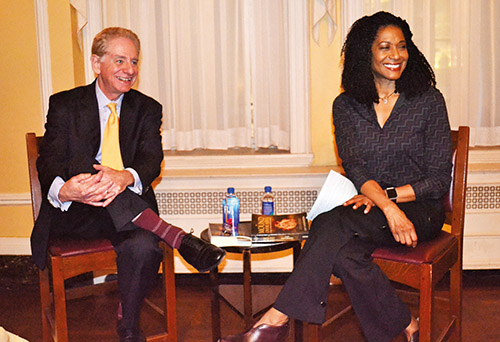


Gary Morgenstein is informal and unpretentious, and has a disarming smile, tongue in cheek sense of humor, and a perspective that is astutely tuned to nuanced changes in society. He is also an incredibly proud and vocal Jew whose Jewish values are woven into his writing. They situate him at the vortex of all things New York–politics, sports (Yup, a Yankees fan), Sci-Fi, and liberal humanism. He’s on a roll. His latest production, A Black and White Cookie, finished its run at The Tank in Manhattan on July 28,
Playwright and author Morgenstein is a “boomer,” and he concedes that many of the issues of the 1960s remain unresolved today. He brings those years–the turmoil and the people looking to make a better world–to his writing. His Dark Depths series (A Mound Over Hell and A Fastball for Freedom) is critically acclaimed. He also contributed to an updated edition of War of the Worlds. For the stage, Morgenstein has also written Saving Stan, A Tomato Can’t Grow in the Bronx, and the off-Broadway sci-fi rock musical The Anthem. A Tomato Can’t Grow in the Bronx will run later in the year, and he’s arranging a reading of his newest play, Free Palestine,, in New Jersey, this summer. It deals with issues of political pressure versus academic freedom.
Morgenstein grew up in the Bronx, six blocks from the shadow of Mickey Mantle; he aspired to be centerfield for the Yankees. He attended SUNY Stonybrook, majoring in politics. After a year at St. John’s Law School, he withdrew; a scenario that the torts professor presented was “a little too unethical for me.” Nevertheless, he’s had a fascinating career path. He lived in London in the 1990s, where he worked in television publicity as head of PR for A&E and joined the British Academy of Film and Television Arts (BAFTA). At the time, A&E was looking to expand its American base. He was also employed by a SciFi channel and then there was a slew of layoffs in cable television.
Morgenstein is outspoken about writing, developing characters, and Judaism’s role in his life and his writing. “Many authors write their avatars. Stories have to be about people. Sometimes you don’t agree with your characters. Sometimes you are ashamed of what they do…but you have to show all sides…We’re all flawed. Even the best people make mistakes. You have to ask your readers to accept that.” They should “root for the character…see the light together.” He points to A Black and White Cookie as an example of that. “It’s about showing that there is more that unites us than divides us,” even though flawed characters appear in all his work. A director once told him, “Your characters are broken people.”
His concern about characters extends to characters in modern movies. Morgenstein dislikes the way computer-generated imaging (CGI) pervades modern movies. It’s “gone away from characters and it’s gone away from dialogue. It’s not purposeful…not as important today as when movies were inspired by theater or novels.” He believes that technical effects have been substituted for real substance and that society is siloed, in part by social media. Since COVID, he maintains, being “siloed” has been exacerbated. “So many things have replaced human emotion. When was the last time anyone wrote you a letter? If you don’t respond to my text in eight seconds, you’re not my friend anymore.”
In his view, theater brings back that emotionality because “television has fallen short of people about whom we can care.…people (are) whining because they can’t find a parking space…You need to differentiate between good and bad… The people in the creative process don’t seem to get that.”
If we look at Morgenstein’s plays, we can see the universal and the Jewish. A Tomato Can’t Grow in the Bronx centers on a dysfunctional working-class Bronx Jewish family in 1968. In the post-show “talkbacks,” all kinds of people, Jewish and non-Jewish, have identified with the characters, who admittedly resemble Morgenstein’s own family.
I ask him what aspects of his Judaism and Jewish values he brings into his work, onstage and elsewhere. “The concept of humanism,” he says. He grew up largely non-observant but started “going back” weekly to synagogue—a misnomer, he says; as a Jew, he never really belonged too much. Much of what he nurtured is a sense of cultural and historical Judaism. “All we have accomplished, all we believe in has always been very strong for me…despite the dysfunctionality.” There was no Shabhos candle-lighting and yet “it was about being a Jew and what it means.”
Writing Jewish stories is more of a challenge today, he says, because they’re simply not as prevalent. For example, A Tomato Can’t Grow in the Bronx is about a union family. Morgenstein’s own father and grandfather belonged to unions and fought against the strike breakers. “Were they Workman’s Circle types?” I ask. His great-grandfather was a communist.
He wonders how many television series today center on a working-class family. “These people were tough guys,” Morgenstein says. In the talkbacks, audience members said “Wow. I didn’t know that Jews were tough.”
As he sees it, though, it’s not the Gentiles who are depicting Jews as soft—it’s the Jewish creatives. “Either we are nebbishes, or orthodontists, or lawyers, or we’re victims,” or crass people. He points to Adam Sandler’s Uncut Gems depiction of a flawed but tough Jewish character as one that we rarely see. In addition, Morgenstein points to an overall dearth of non-stereotypical Jewish characters and Jewish characters being played by Jews. The reluctance to depict these characters stems from Hollywood’s early days, where Jewish studio heads, sensitized by memories of pogroms, hesitated to make Jewish waves. These media moguls even asked 20th Century Fox’s non-Jewish Darryl Zanuck not to produce the acclaimed 1948 film Gentlemen’s Agreement, with its mainly non-Jewish cast. Little has changed in today’s world.
In a Black and White Cookie, Morgenstein wanted to call attention to modern antisemitism. He didn’t want to make the antisemite a white supremacist. “That’s been done to death. That’s not the only threat,” he says, pointing to the surge in antisemitic hate crimes in the U.S., 60% of which occur in New York City. Rather, the play’s antisemitic characters are African American, but as their relationship with the Jewish activist develops, the dynamics and attitudes change on both sides (spoiler alert). Morgenstein shows what happens when good people have prejudiced views, and good people look away. “We’re all those people…I wanted to show… how you get above that,” he says.
“Even though we have differences, he believes, we have so much about which we can connect…It’s easy to join the crowd and yell at each other,” he posits, “That gets us nowhere…Listening, that’s drama…maybe… understanding. You always have to give the audience a way to move forward and show the light… We just can’t say, ‘Oy Vey, that’s horrible.’”
The off-Broadway run of A Black and White Cookie exemplifies this. Albie Sands (J. Dolan Byrnes), late 60-something homeless Jew (yes, world, they exist) is a radical communist throwback to the turbulent ‘60s and ‘70s. His responses to society’s ills are protest and a systemic shakeup. In Albie’s time warp, revolutionary platitudes can bring powerful people and institutions to their knees. He waves his fist, shouts, and spouts slogans about capitalism to contest the rent increase for African American ex-Marine Vietnam veteran Harold Wilson (Russell Jordan), an obsessive Mets fan in his late 60s. The increase forces Harold to close his newsstand. His Floridian niece Carol (Roslyn Searle) helps prepare him to move in with her—that is, before Harold is lassoed into Albie’s quest for justice.
Carol’s skepticism about Albie’s motivation is antisemitic at its core. ”Since when do Jews help anyone but themselves? That’s how so few of you have so much.” She rails against the Jewish lawyer and landlord, whom, she believes, destroyed Harold’s brother’s business and life.
Carol is also xenophobic. Regarding Harold’s Asian landlord, she says, “Asians are just Jews with better noses.” With time, Carol treats Alfie nonjudgmentally, provides him with a bed and food, nurses his cough, and accepts his media “campaign” to support Harold. Pham (Marina Rebecca Chan), Harold’s female Vietnamese landlord, comments on this unlikely Afro-Jewish rallying cry but the press’ demonization of her yet doesn’t move her to lower Harold’s rent. Ultimately, her actions, based on respect (Spoiler Alert!), enable Harold to relocate his stand and independence.
Despite the script’s seriousness, the dialogue and verbal sparring are quite funny. The characters’ initial preconceptions and prejudices morph into caring, as when Harold searches the streets for Albie. The characterizations are all credible, but J. Dolan Byrnes’ Albie is somewhat overstated–even radical revolutionaries exhibit subtlety and “fist-less” moments–and would benefit from a wider radius of movement onstage. Yet despite minor wrinkles, the play’s messages about transcending prejudices to achieve shared goals resonate today.
Morgenstein then ponders the broader question of global antisemitism. He has experienced it as an American, not as a European, and notes that even though antisemitism is more pronounced now, many think that it won’t happen here. He recalls Paddy Chayefsky’s quip—a Jew must always keep a packed bag in the hall closet. It is not preordained that America will remain a great and free country, or that Jews will not be attacked again, he adds. Our political influence is not as significant as it used to be.
When the conversation cycles to the role of the arts in understanding others, avoiding being judgmental, and changing attitudes with empathy, Morgenstein returns to his goal: “Just trying to change the world, one performance at a time….Never underestimate the human spirit,” he adds.
Rachel Kovacs is an Adjunct Associate Professor of communication at CUNY, a PR professional, theater reviewer for offoffonline.com—and a Judaics teacher. She trained in performance at Brandeis and Manchester Universities, Sharon Playhouse, and the American Academy of Dramatic Arts. She can be reached at mediahappenings@gmail.com.












